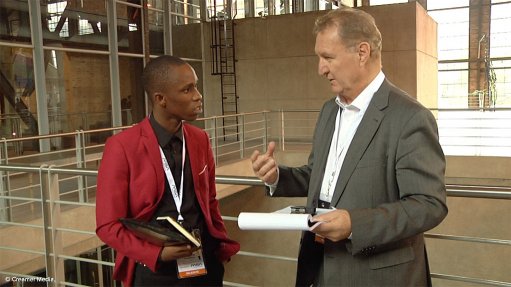
Smangaliso Musawenkosi (left) and Martin Creamer
Photo by: Creamer Media
JOHANNESBURG (miningweekly.com) – Jobless mining engineering graduates are pleading for inclusion in South Africa’s mining industry in preparation for the sector’s inevitable upturn in the future.
Speaking to Creamer Media’s Mining Weekly Online in a video interview on the sidelines of the Junior Indaba in Johannesburg, Society of Mining Engineering Students independent presidential adviser Smangaliso Musawenkosi outlined the current difficulty mining engineering graduates have in finding employment in mining.
“I’m talking about students with honours in mining engineering,” said Musawenkosi, whose comments follow those of Professor Emeritus Huw Phillips that, after decades of undersupply, mining engineering graduates are now struggling to find mining jobs.
Phillips is encouraging the industry to have the foresight to develop the raw talent at its disposal to ensure that South Africa is well positioned to take advantage of the next upturn.
The main three universities that offer mining engineering degrees are the University of the Witwatersrand, the University of Pretoria and the University of Johannesburg.
Musawenkosi is hopeful that through constructive engagement with the mining industry, work will be found for jobless graduates.
The Society of Mining Engineering Students is also taking steps to help the many students unable to complete their degrees because the mining industry is denying them the opportunity to do the necessary vacation work.
Quick to latch on to the jobless mining graduate disappointment has been veteran research commentator Dr RE (Robbie) Robinson, who has called for a research revolution to keep the surfeit of jobless graduates in the industry.
The one-time National Institute for Metallurgy, now Mintek, director has for long advocated the creation of mining clusters to get the best out of the mining industry and also facilitate the social coherence and common loyalties the sector so desperately needs.
Robinson’s vision, which he has detailed in innumerable articles for the South African Institute of Mining and Metallurgy journal, involves the holistic use of mine land to provide a revenue stream for the mining proposed clusters.
Musawenkosi was sure that jobless mining engineering graduates would welcome becoming part of any research effort and emphasised that mining was not just about extracting mineral and metal deposits but embraced a wide spectrum of support activities.
Robinson sees research as having a spider’s web of possibilities and has been trying to convince the mining industry to have a portfolio of research and to get away from the selection of one favourite project.
His philosophy is to have a portfolio of research projects where there are several alternatives to solving a problem in the belief that the chances of finding the final answer are far better with three or more alternatives than with one chosen path.